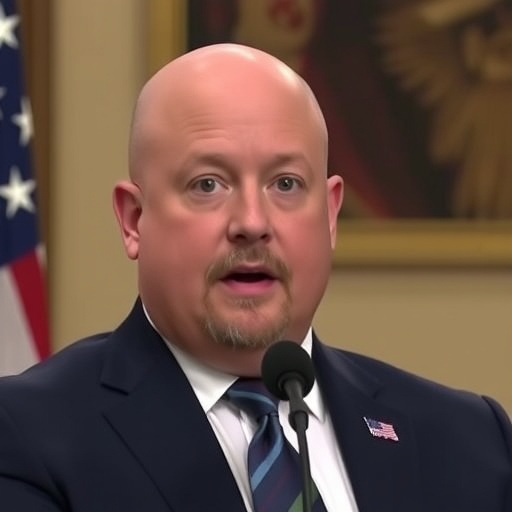Senator Mark Kelly Demands Answers on Trump’s Questionable US Military Deployment Near Venezuela
In a bold move on the Senate floor, Democratic Senator Mark Kelly from Arizona has thrust the Trump administration’s recent military maneuvers into the spotlight, questioning the legality of deploying an aircraft carrier battle group near Venezuela and demanding clear justification for what he calls “questionable” activities. This development, unfolding amid escalating tensions in Latin America, could signal a new flashpoint in U.S. foreign policy, raising alarms about potential overreach by the US military in the region.
Kelly, a former Navy combat pilot and astronaut with deep experience in national security matters, voiced his concerns during a heated session on Wednesday, highlighting the deployment of the USS Abraham Lincoln carrier strike group to waters off Central and South America. “This isn’t just a routine exercise,” Kelly stated emphatically. “The American people deserve to know if this deployment complies with international law and congressional oversight. The Trump administration must provide the legal basis for putting our troops in harm’s way near Venezuela.” His remarks have ignited a firestorm of debate, with implications rippling through Capitol Hill and beyond.
The senator’s intervention comes at a time when U.S.-Venezuela relations are at a boiling point, exacerbated by the ongoing political crisis in Caracas and accusations of human rights abuses under President Nicolás Maduro. With the carrier group now positioned strategically in the Caribbean, critics like Kelly argue that the move blurs the line between deterrence and provocation, potentially violating treaties like the United Nations Charter or the Monroe Doctrine’s modern interpretations.
Kelly’s Senate Showdown: A Call for Transparency
Senator Mark Kelly‘s pointed critique wasn’t born in a vacuum. As a freshman senator with a stellar military background—having flown 39 combat missions during the Gulf War—Kelly has positioned himself as a voice of reason on defense issues. His speech, delivered with the gravitas of someone who’s seen the front lines firsthand, lasted over 20 minutes and drew applause from fellow Democrats while eliciting eye-rolls from Republican colleagues.
“I’ve served my country in uniform, and I know the difference between necessary vigilance and reckless escalation,” Kelly declared, his voice steady but laced with urgency. He referenced specific intelligence reports, though classified, suggesting the deployment might exceed the authority granted under the 2001 Authorization for Use of Military Force (AUMF), a post-9/11 law that’s been stretched thin in recent years. Kelly demanded that the Pentagon submit a detailed report within 30 days, outlining the operational objectives, rules of engagement, and any consultations with allies like Colombia or Brazil.
This isn’t Kelly’s first foray into challenging executive overreach. Just last month, he co-sponsored a bill aimed at reining in presidential war powers, citing the Trump administration’s drone strike policies in the Middle East as precedent. Now, with Venezuela in the crosshairs, his push for legality checks underscores a broader Democratic strategy to hold the administration accountable as midterm elections loom.
Behind the scenes, sources indicate Kelly coordinated with Senate Foreign Relations Committee Chair Bob Menendez, who has long been vocal about Venezuela’s humanitarian crisis. Together, they plan to introduce a resolution next week that would require Senate approval for any escalation involving the US military in the Western Hemisphere. This could force a vote that tests party lines, especially among Republicans wary of alienating Latin American partners.
Unpacking the Deployment: Aircraft Carrier’s Shadow Over the Caribbean
The USS Abraham Lincoln, a Nimitz-class behemoth capable of carrying over 60 aircraft and 5,000 sailors, left its home port in San Diego two weeks ago, ostensibly for a routine deployment. But its rerouting toward the Caribbean—within striking distance of Venezuela‘s coastline—has raised eyebrows across the globe. Accompanied by destroyers, cruisers, and submarines, the battle group represents one of the most significant US military showings in the region since the 1989 invasion of Panama.
According to Pentagon spokespeople, the mission is framed as a response to “regional instability,” pointing to Venezuela’s economic collapse, where hyperinflation has soared past 1 million percent and millions have fled as refugees. The carrier’s presence, they claim, supports humanitarian aid efforts and deters any aggressive moves by Maduro’s regime, which has been accused of harboring Colombian guerrillas and Russian operatives.
Yet, details remain murky. Satellite imagery analyzed by the Center for Strategic and International Studies (CSIS) shows the carrier conducting flight operations just 200 miles from Venezuelan waters, including F/A-18 Super Hornet sorties that could easily monitor or intercept Venezuelan MiG-29 jets. No official notice was given to Congress under the War Powers Resolution, which mandates reporting within 48 hours of deploying forces into hostilities—a omission that Senator Mark Kelly hammered in his address.
Historical context adds layers to this saga. During Trump’s first term, the administration imposed crippling sanctions on Venezuela, recognizing opposition leader Juan Guaidó as interim president in 2019. That move led to covert operations, including alleged cyber intrusions, but stopped short of direct military action. Now, with Trump back in the White House, hawks like Secretary of State Mike Pompeo have revived rhetoric about “all options on the table,” fueling speculation that this deployment is a prelude to regime change.
Numbers paint a stark picture: Venezuela’s military, though loyal to Maduro, boasts over 100,000 active personnel and Russian-supplied S-300 air defenses. A clash could draw in allies—Russia has stationed troops in Caracas, while China holds billions in oil-backed debt. The US military‘s involvement risks a proxy war, with economic fallout estimated by the IMF at $500 billion in disrupted trade if tensions boil over.
- Key Assets in the Battle Group: USS Abraham Lincoln (carrier), USS Leyte Gulf (cruiser), two Arleigh Burke-class destroyers, and a Los Angeles-class submarine.
- Personnel: Approximately 7,500 service members, including pilots trained for precision strikes.
- Capabilities: Tomahawk missiles with 1,000-mile range, capable of targeting Venezuelan oil facilities.
Experts note that while the deployment bolsters U.S. deterrence, it also strains resources. The Navy is already stretched thin, with only 11 carriers operational amid maintenance backlogs. This positioning near Venezuela diverts assets from hotspots like the South China Sea, prompting questions about strategic priorities under Trump.
Legal Minefield: Navigating International Law and War Powers
At the heart of Senator Mark Kelly‘s rebuke is a fundamental question of legality: Does the Trump administration have the constitutional authority to station a carrier group so provocatively without explicit congressional approval? Legal scholars are divided, but the consensus leans toward caution.
Article I, Section 8 of the U.S. Constitution grants Congress the power to declare war, yet presidents have increasingly relied on the AUMF and inherent commander-in-chief powers for interventions. In the case of Venezuela, no imminent threat to U.S. soil has been articulated, leading critics to invoke the 1973 War Powers Resolution. That law requires the president to notify Congress of deployments and withdraw forces after 60 days unless authorized.
“This deployment skirts the edges of legality,” said Georgetown University law professor Rosa Brooks, a former Pentagon official. “Without a clear self-defense justification under Article 51 of the UN Charter, it could be seen as an unlawful use of force, inviting international condemnation.” Brooks pointed to precedents like the 2011 Libya intervention, where Obama faced backlash for exceeding UN mandates.
On the flip side, administration defenders argue the move falls under maritime freedom of navigation operations, protected by the Law of the Sea Convention. Trump loyalists, including former National Security Advisor John Bolton, have praised it as “maximum pressure” to force Maduro’s ouster, citing Venezuela’s alleged drug trafficking ties to cartels threatening U.S. borders.
Internationally, reactions are swift. The Organization of American States (OAS) issued a statement urging de-escalation, while Venezuelan Foreign Minister Jorge Arreaza decried it as “imperialist aggression.” Russia, a key Maduro backer, has mobilized its own naval assets in the Atlantic, heightening the stakes. Domestically, a poll by Quinnipiac University shows 58% of Americans oppose military involvement in Venezuela without UN backing, reflecting war fatigue after Afghanistan and Iraq.
- War Powers Resolution (1973): Requires presidential reporting and limits unauthorized engagements to 60 days.
- UN Charter Article 2(4): Prohibits threats to territorial integrity; violations could lead to sanctions.
- Posse Comitatus Act: Indirectly relevant, barring military in domestic law enforcement but not foreign ops.
Kelly’s demand for justification echoes bipartisan concerns. Even some Republicans, like Senator Lindsey Graham, have privately expressed unease, fearing it could entangle the US military in another quagmire. If unresolved, this could culminate in a Supreme Court challenge, testing the boundaries of executive power in the post-Trump era.
Broader Ripples: Allies, Adversaries, and Regional Fallout
The deployment’s shockwaves extend far beyond Washington. In Latin America, nations like Colombia—home to 1.8 million Venezuelan refugees—are caught in a bind. President Iván Duque welcomes U.S. support against Maduro but fears blowback from border skirmishes. Brazil’s Jair Bolsonaro, a Trump ally, has offered logistical aid but stopped short of committing troops, wary of Amazon environmental pacts at risk.
Economically, the stakes are enormous. Venezuela holds the world’s largest proven oil reserves, at 303 billion barrels, per OPEC data. Disruptions could spike global prices by 20-30%, hitting U.S. consumers amid inflation concerns. Humanitarian groups like Human Rights Watch report that 7.7 million Venezuelans have fled since 2015, with U.S. aid shipments now under carrier escort—a double-edged sword that aids delivery but escalates optics.
From Moscow to Beijing, adversaries are watching closely. Russia’s deployment of S-400 systems to Venezuela in 2020 already irked the U.S.; this carrier move could provoke a tit-for-tat in Syria or Ukraine. China, with $60 billion invested, has urged dialogue through the UN, positioning itself as a peacemaker to counter American influence.
Domestically, Senator Mark Kelly‘s stance resonates with his Arizona constituency, where Latino voters—many with Venezuelan ties—prioritize diplomacy. Advocacy groups like the Council on Foreign Relations warn of unintended consequences, including empowered hardliners in Caracas who could accelerate nuclear ambitions with Iranian help.
Interviews with military analysts reveal mixed views. Retired Admiral James Stavridis, former NATO commander, called the deployment “prudent signaling” but urged clearer exit strategies. Conversely, the Atlantic Council’s Jason Marczak highlighted risks to U.S. credibility if the operation fizzles without results, echoing the 2019 failed coup attempt against Maduro.
Looking Ahead: Congressional Hearings and Diplomatic Maneuvers
As Senator Mark Kelly rallies support, the path forward points to intensified scrutiny. The Senate Armed Services Committee has scheduled hearings for next Tuesday, where Defense Secretary Lloyd Austin will testify on the deployment’s legality. Kelly is expected to lead questioning, potentially subpoenaing classified briefings to expose any lapses in oversight.
Diplomatically, the U.S. is pushing for a special OAS summit in Miami, aiming to isolate Venezuela further. Trump has hinted at personal diplomacy, tweeting, “Maduro’s days are numbered—America stands strong!” But with midterms approaching, Republicans may seek compromise to avoid a veto fight over funding the US military presence.
Long-term, this episode could reshape U.S. strategy in the Americas. If Kelly’s efforts succeed, it might restore congressional war powers, preventing future unilateral actions. Failure, however, risks normalizing such deployments, setting a precedent for flashpoints from Taiwan to the Arctic. As tensions simmer, the world watches: Will this be a masterstroke of deterrence or the spark of unintended conflict? The answer lies in the halls of power, where Trump‘s bold gambit meets Kelly’s unyielding demand for accountability.








